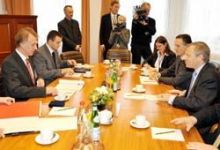On Jan. 18, official Kyiv forwarded a letter to the NATO Secretary General, requesting the Membership Action Plan (MAP). Ukraine’s Minister of Foreign Affairs Volodymyr Ohryzko, on a visit to Brussels, handed the letter to NATO Secretary General Jaap de Hoop Scheffer during a meeting. For the first time in Ukrainian history this letter was signed, on Jan. 15, by Ukraine’s leadership: President Viktor Yushchenko, Prime Minister Yulia Tymoshenko, and Parliamentary Speaker Arsenii Yatseniuk.
The Secretary General congratulated Volodymyr Ohryzko on his ministerial appointment and called attention to the importance of a more active high-level dialog with Ukraine. He promised to advise the NATO countries of this document. Scheffer stressed that the Alliance highly values its special partnership relations with Ukraine, and that the member countries are prepared to continue actively cooperating with Ukraine to help realize its Euro-Atlantic aspirations. On behalf of NATO, the Secretary General thanked Ukraine for its consistent contributions to strengthening Euro-Atlantic security in the framework of Operation Active Endeavor, as well as other NATO missions and operations.
The Ukrainian foreign minister said that President Yushchenko and the current government of Ukraine have the same view of Ukraine’s foreign political prospects, as well as the political will and mechanisms required to reach these goals. Ohryzko also assured Scheffer that the 2008 Ukraine-NATO Target Plan would be approved within the shortest possible period of time, and that it would be timely and meticulously implemented. Both sides also pointed out the importance of keeping Ukrainian society informed about Ukraine’s cooperation with NATO.
As was to be expected, Russia took a dim view of Ukraine’s decision to move closer to NATO. Russia’s Ambassador to Ukraine Viktor Chernomyrdin declared that Moscow may revise its relationships with Ukraine if it joins NATO. Chernomyrdin added that, in his opinion, Ukraine’s NATO membership is a decision that should be made by the citizens of this country, by a referendum.
Ukrainian experts, however, believe that the possibility of Ukraine joining the MAP will not have any serious effects on our country’s relations with Russia. Oleksandr Sushko, the director of the Peace, Conversion and Foreign Policy Center, says that Ukraine’s move can only expedite the process of straightening out relations with both NATO and other countries. This expert stressed that other countries are trying to use Ukraine’s present ambiguous strategic course to their own ends. Sushko believes that the Russian ambassador’s statement should be regarded as an opportunity to put its relations with Russia in order, not as a threat to Ukraine.
Valerii Chaly, the deputy director of the Razumkov Center, noted that none of the members of Russia’s political elite will have a positive attitude to Ukraine’s NATO membership. He pointed to the fact that Russia has responded negatively to Poland, the Czech Republic, Hungary, and the Baltic countries’ NATO membership, but the situation has changed.
Hryhorii Perepelytsia, director of the Foreign Policy Institute at the Diplomatic Academy under the aegis of Ukraine’s Ministry of Internal Affairs, reminded those present that Russia’s commentaries often includes statements about being prepared to honor the sovereign choice made by Ukraine and its people. He said he doubts that Russia will ever resort to any “threatening” acts against Ukraine if it joins NATO.
Ukrainian experts also believe that Ukraine’s accession to the MAP will give an impetus to reforms in various spheres of life and will bring the country closer to European standards. “Work will actually start only after Ukraine joins the MAP. I hope that a mobilization of our cadre and material resources will follow our political will,” Chaly said. In his opinion, Ukraine’s accession to the MAP will make it possible for Ukrainian nationals to receive additional mechanisms of control over the government, particularly along the lines of judiciary reform, ways of improving Ukraine’s ecological situation and ensuring human rights. He stressed that Ukraine’s accession to the MAP is not a direct application for NATO membership, which entails the implementation of a wide variety of measures. There are countries that have held MAP status for nine years, but their NATO membership is not guaranteed.
Sushko believes that Ukraine’s fulfillment of the MAP program will help alter the culture of the country’s domestic and foreign policies, without which Ukraine will never become a European country. He also thinks that European countries, including NATO members, will accept Ukraine as another member of the European community of nations once it implements reforms in keeping with the MAP. These experts also believe that it is important for Ukraine to become further involved in global and regional security systems after joining the MAP.








